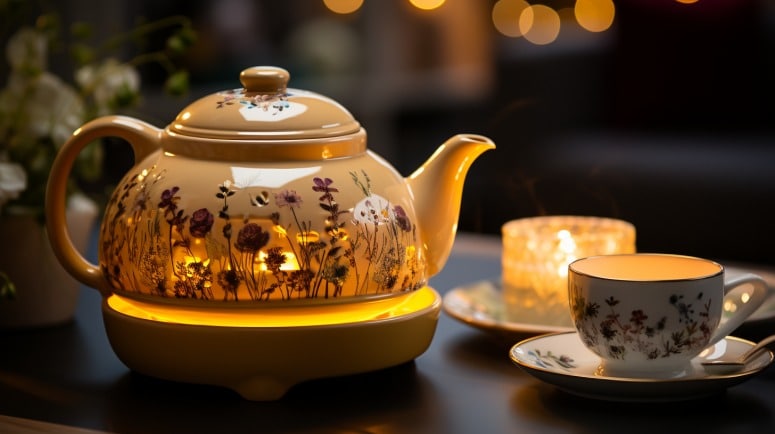Welcome to the world of jasmine tea, a captivating beverage that combines the enchanting aroma of jasmine blossoms with the soothing qualities of tea. Whether you’re a tea connoisseur or simply curious about discovering new flavors, jasmine tea offers a delightful experience for all.
Indulging in a cup of jasmine tea allows you to embrace its unique blend of flavors and fragrances, providing a moment of tranquility and pleasure. Its delicate floral notes and smooth taste make it a favorite option among tea lovers worldwide.
However, the appeal of this tea goes beyond its delectable taste. With a rich history and a wide range of health benefits, this fragrant elixir offers more than just a pleasurable drinking experience.
In this article, we will explore the fascinating origins of jasmine tea, uncover the secrets behind its production, delve into its numerous health benefits, and discuss the distinct taste and scent that make it beloved by many. So, join us as we embark on this aromatic journey to unlock the wonders of jasmine tea.
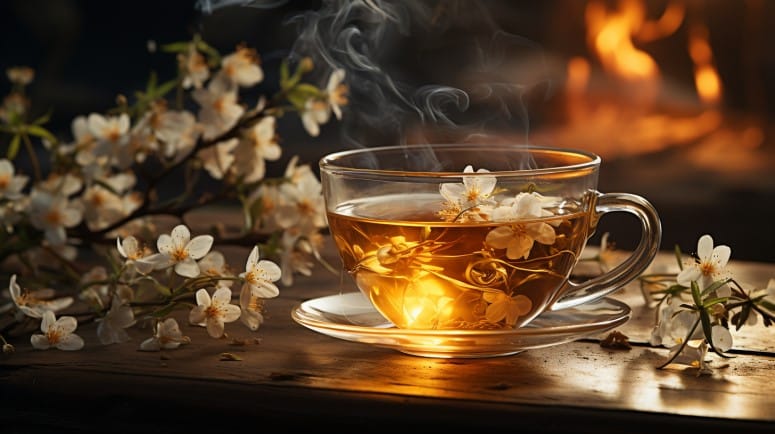
Table of Contents
History of Jasmine Tea
The roots of jasmine tea can be traced back to ancient China, where the captivating scent of jasmine blossoms caught the attention of tea artisans. It is believed that the art of scenting tea with jasmine originated in the southeastern regions of China during the Song Dynasty (960-1279).
The popularity of jasmine tea quickly spread throughout the country and became synonymous with Chinese tea culture. It was not long before its fame reached beyond China’s borders and captivated tea enthusiasts worldwide.

Besides its aromatic appeal, jasmine tea holds great cultural significance. In Chinese tradition, jasmine symbolizes elegance, grace, and purity. It has been used in various ceremonial and cultural practices, such as weddings and religious rituals.
During the Ming Dynasty (1368-1644), jasmine tea made its way to the West through the Silk Road trade route. Its alluring fragrance and unique flavor intrigued European traders and explorers, who were eager to introduce this precious beverage to their own cultures.
Today, jasmine tea continues to enchant tea lovers around the globe. It has evolved and diversified, leading to different variations and blends that cater to diverse preferences and tastes.
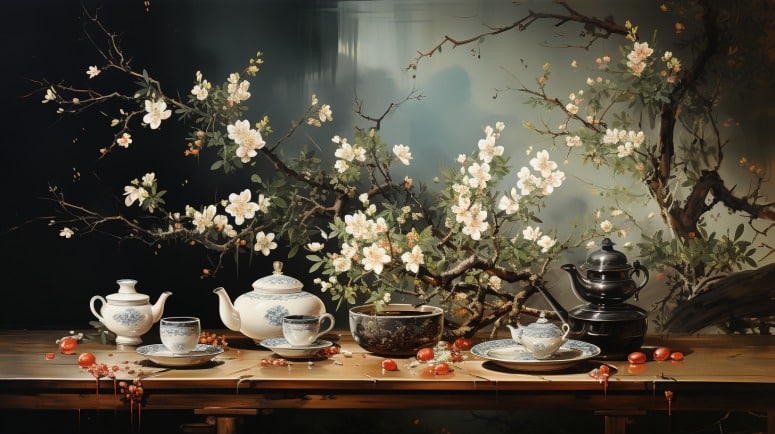
How Jasmine Tea is Made
The process of making jasmine tea is an art form that requires both skill and precision. It involves infusing the base tea leaves with the captivating scent of jasmine flowers. The result is a harmonious blend that combines the natural flavors of tea with the delicate floral aroma of jasmine.
Here’s how jasmine tea is made:
Harvesting
Fresh jasmine flowers are plucked from jasmine plants, typically in the late summer when they are most fragrant.

Green Tea Base
Chinese green teas, such as Yin Hao, are selected as the base for jasmine tea due to their compatibility with the floral notes.
Layering
Alternating layers of green tea leaves and jasmine flowers are carefully placed together.
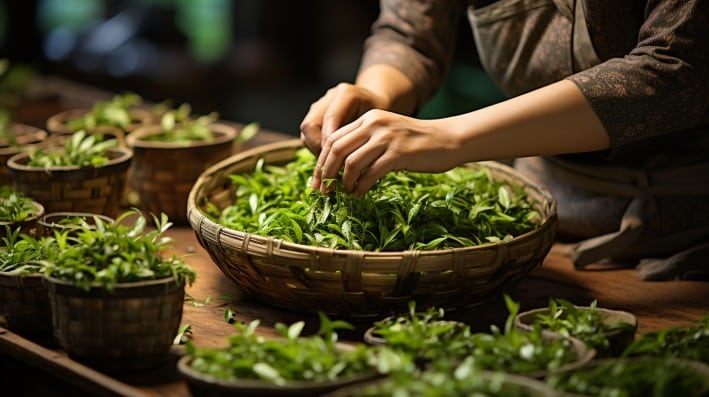
Scenting
The tea leaves are left to absorb the natural essence of jasmine for several hours or overnight, allowing the aroma to intermingle with the tea leaves.
Drying
After sufficient scenting, the tea leaves are gently dried to remove any excess moisture and preserve the flavors.
Separation
The jasmine flowers are separated from the tea leaves, resulting in the final product of jasmine tea.

Blending (optional)
In some cases, the jasmine tea may be blended with other ingredients, such as herbs or fruits, to create unique jasmine tea blends, adding additional flavors and aromas.
This process allows the tea leaves to capture the enchanting fragrance of jasmine, resulting in a delightful cup of jasmine tea. The careful cultivation and scenting methods contribute to its distinction as one of the most famous scented teas.
Health Benefits of Jasmine Tea
Beyond its captivating aroma and delightful taste, jasmine tea offers a range of potential health benefits. Let’s take a closer look at how indulging in a cup of jasmine tea can contribute to your overall well-being:
Bursting with Antioxidants
Jasmine tea is rich in antioxidants, which help protect the body against harmful free radicals. These antioxidants help boost the immune system, reduce inflammation, and combat oxidative stress.
Potential Weight Loss Benefits
Some studies suggest that the combination of catechins found in jasmine tea and its moderate caffeine content may help increase metabolism and promote weight loss. However, it’s essential to maintain a balanced diet and incorporate regular exercise for effective weight management.
Heart-Protective Effects
The antioxidants in jasmine tea, such as flavonoids, have been linked to a reduced risk of heart disease. Regular consumption of jasmine tea may help lower blood pressure, reduce LDL cholesterol levels, and promote healthy cardiovascular function.
Good Oral Health
The antibacterial properties of jasmine tea can potentially contribute to improved oral health. It may help inhibit the growth of cavity-causing bacteria and reduce the risk of dental issues, such as tooth decay and gum disease.

Brain Function and Mental Clarity
Some research suggests that the aroma of jasmine flowers has a calming effect on the brain. Enjoying jasmine tea can help promote relaxation, reduce stress levels, and enhance mental clarity and focus.
Decreased Risk of Type 2 Diabetes
Studies have shown that regularly consuming jasmine tea may help regulate blood sugar levels and improve insulin sensitivity, potentially reducing the risk of type 2 diabetes.
Potential Cancer-Fighting Properties
While more research is needed, preliminary studies have indicated that the antioxidants present in jasmine tea may have anti-cancer properties. However, it’s important to note that jasmine tea should not be considered a sole treatment for cancer, and medical advice should be sought for appropriate diagnosis and treatment.
It’s important to remember that while jasmine tea offers potential health benefits, individual results may vary. It’s always advisable to incorporate jasmine tea as part of a balanced and healthy lifestyle.
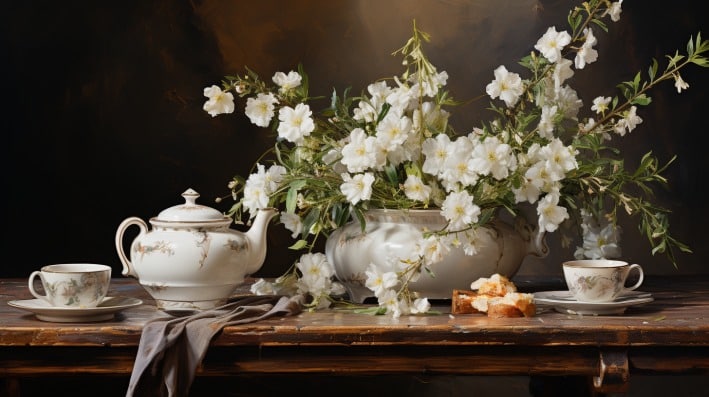
Taste and Scent of Jasmine Tea
The taste and scent of jasmine tea are what truly set it apart from other types of tea. When you enjoy a cup of jasmine tea, you are treated to a delightful and aromatic experience that engages all your senses.
The scent of jasmine tea is like a fragrant bouquet of flowers, captivating and soothing. As you inhale the aroma, your senses are transported to a tranquil garden filled with blooming jasmine blossoms.
When it comes to taste, jasmine tea offers a delicate and refreshing flavor profile. The base tea, whether it is green, white, or black, provides a subtle and nuanced backbone that harmonizes with the jasmine essence.
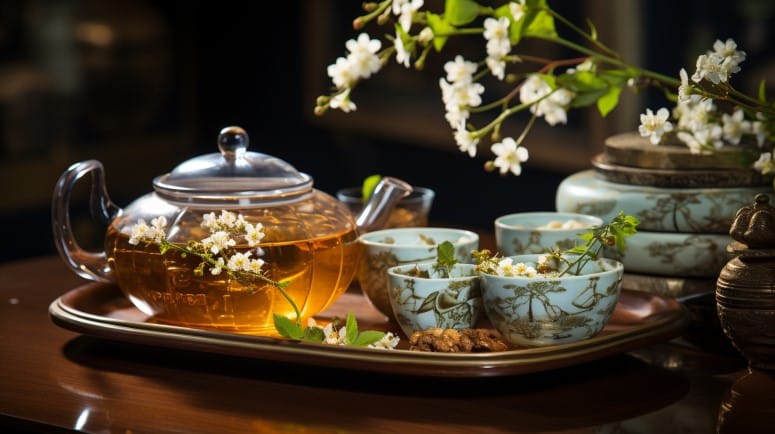
Those who relish green jasmine tea will appreciate its grassy and slightly vegetal taste. The brightness of the green tea melds seamlessly with the floral notes of jasmine, creating a well-balanced and refreshing cup.
For those seeking a more refined and subtle taste, white jasmine tea is a perfect choice. It offers a gentle and elegant flavor, with hints of sweetness and a floral undertone that lingers on the palate.
If you prefer a bolder and more robust tea experience, black jasmine tea delivers with its deep, malty taste. The fusion of the full-bodied black tea and the fragrance of jasmine creates a rich and intense cup.
Additionally, there is the indulgent pleasure of jasmine milk tea, which combines the floral aroma of jasmine with creamy milk. This velvety and comforting concoction offers a delightful treat with its smooth and slightly sweet taste.
It’s important to note that the taste of jasmine tea can vary depending on various factors, such as the quality of the tea leaves and the intensity of the scenting process. These variations add to the allure, as you can explore different teas and discover your personal preference.

How to Brew Jasmine Tea
Brewing the perfect cup of jasmine tea requires a delicate balance of time, temperature, and technique. Follow these simple steps to achieve an aromatic and flavorful experience:
1. Choose Quality Tea: Start with high-quality jasmine tea leaves or tea bags. Look for reputable tea brands that source their tea from reliable sources.
2. Heat the Water: Boil water and let it cool for a few minutes to around 180°F (82°C) for green and white jasmine tea, or 200°F (93°C) for black jasmine tea. Avoid using boiling water, as it can potentially scorch the tea leaves.
3. Measure the Tea: Use approximately 1 teaspoon of loose tea leaves or one tea bag for every 8 ounces (240 mL) of water. Adjust the amount based on your personal taste preference and the strength of the tea.
4. Infusion Time: Steep the tea for 2-3 minutes for green and white jasmine tea, or 3-5 minutes for black jasmine tea. Longer infusion times can result in a more intense flavor, but be cautious not to overbrew, as it can make the tea bitter.
5. Embrace Multiple Infusions: Jasmine tea leaves can often be infused multiple times. Experiment with different steeping times and water temperatures to discover your preferred flavor profile.
6. Savor the Aroma: As you pour your brewed jasmine tea into a cup, take a moment to inhale the captivating aroma. Allow it to whisk you away to a tranquil garden of blooming jasmine.
7. Serve and Enjoy: Pour the fragrant tea into a teacup and savor each sip. You can drink it plain or add a touch of honey or lemon to enhance the taste, if desired.
Remember, brewing tea is a personal experience, and you can customize the steps and parameters to suit your taste preferences. Don’t be afraid to experiment and find the brewing method that brings you the most joy and satisfaction.
Now that you know how to brew a perfect cup of jasmine tea, let’s discuss an important aspect – the safety and potential side effects associated with jasmine tea.
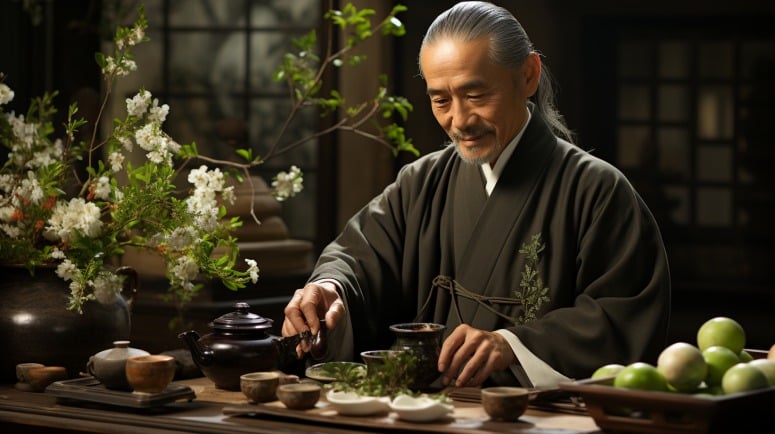
Jasmine Tea and Mindfulness: Cultivating Calmness and Presence in Every Sip
Beyond its aromatic allure and health benefits, jasmine tea has the incredible power to enhance moments of mindfulness and promote a sense of calmness and presence. Let’s explore how incorporating jasmine tea into your mindfulness practices can elevate your tea-drinking experience:
1. Aromatic Indulgence: The scent of jasmine tea invites you to pause and savor the present moment. As you take a sip, close your eyes and let the enchanting aroma envelop your senses. Focus on the aroma, allowing it to anchor you in the present and create a serene atmosphere.
2. Sip with Intention: With each sip of jasmine tea, bring your full attention to the present moment. Notice the warmth of the cup in your hands, the sensation of the tea as it touches your lips, and the flavors that dance on your tongue. Breathe deeply and embrace the experience fully.
3. Mindful Tea Rituals: Engage in mindful tea rituals by incorporating step-by-step awareness into your brewing process. Take your time to measure the tea leaves, heat the water, and infuse the tea mindfully. Pay attention to every movement and sensation, allowing the process to become a meditative practice in itself.
4. Savoring the Present: Embrace the present moment by savoring each sip of jasmine tea. Instead of rushing through your cup, take frequent breaks between sips and pause to fully appreciate the flavors, the texture, and the overall experience. Let go of distractions and be fully present with your tea.
5. Calming Rituals to Unwind: Create a daily tea-drinking ritual as a form of self-care and relaxation. Set aside a dedicated time for indulging in a cup of jasmine tea, allowing it to become a cherished moment of tranquility in your day. Take this opportunity to slow down, reflect, and nourish your mind and body.
By incorporating mindfulness into your jasmine tea-drinking experience, you can create a harmonious connection between the present moment, your tea, and yourself. Embrace the serene tranquility that jasmine tea offers and let it be a catalyst for cultivating calmness and presence in your life.

Safety and Side Effects of Jasmine Tea
Jasmine tea is generally safe for consumption when enjoyed in moderate amounts. However, it’s important to keep in mind a few factors to ensure a safe and pleasant tea-drinking experience:
Pregnancy and Breastfeeding
While jasmine tea is generally considered safe, pregnant or breastfeeding women should consult their healthcare provider before consuming it. Jasmine tea contains caffeine, and excessive intake of caffeine should be avoided during pregnancy and breastfeeding.
Individual Sensitivities
Some individuals may have allergies or sensitivities to jasmine or tea. If you experience any allergic reactions, such as skin rashes, difficulty breathing, or digestive issues, it’s advisable to discontinue the consumption of jasmine tea and seek medical advice.
Caffeine Content
Jasmine tea, depending on the base tea used, contains varying amounts of caffeine. If you are sensitive to caffeine or have certain health conditions like insomnia or anxiety, it’s recommended to opt for decaffeinated varieties or limit your intake of this tea.
Drug Interactions
Jasmine tea, like many other teas, contains compounds that may interact with certain medications. If you are taking any medications or have specific medical conditions, it’s advisable to consult your healthcare provider to ensure the safe consumption of this tea.
In general, it’s important to consume jasmine tea in moderation as part of a balanced and varied diet. If you have any concerns or underlying health conditions, it’s always best to seek professional medical advice before making any significant changes to your diet.
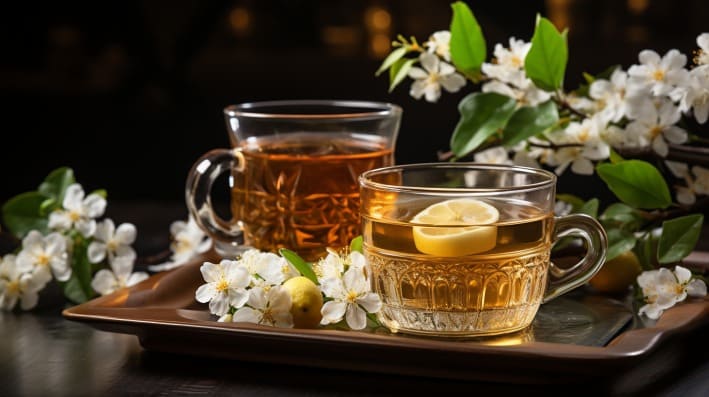
Conclusion
Drinking jasmine tea offers a delightful and aromatic experience that engages the senses. Made from fresh jasmine flowers and a tea base, such as green tea leaves, this traditional tea has gained popularity worldwide as one of the most famous scented teas.
Jasmine tea is known for its delicate flavor and enticing aroma, derived from the infusion of jasmine petals. Whether enjoyed on its own or blended with other teas, jasmine tea offers a unique taste that appeals to tea connoisseurs.
Not only does jasmine tea excite the taste buds, but it also provides a range of potential health benefits. Scientific evidence suggests that the tea’s high levels of tea polyphenols, found in green tea, may help improve heart health, reduce the risk of certain cancers, and promote oral health.
For those looking to relax and unwind, this tea’s strong scent can help calm the nervous system and aid in relaxation. Its caffeine content, although lower than in black teas, remains a consideration for individuals monitoring their caffeine intake, particularly pregnant women or those with specific sensitivities.
The cultivation of jasmine tea begins in tea gardens, where the delicate jasmine flowers are skillfully harvested and combined with green tea leaves or other tea bases. The process of scenting the tea involves layering the green tea with fresh jasmine flowers, allowing the leaves to absorb the natural jasmine oil and infuse with their captivating aroma.
To fully appreciate the taste and benefits of this tea, opt for loose leaf varieties, as they provide the highest quality and allow for a better infusion. Brewing this tea with filtered water at the appropriate temperature ensures an optimal flavor profile.
As you embark on your journey with this tea, remember to enjoy it in moderation and as part of a balanced lifestyle. Whether looking to savor the unique taste or reap the potential health benefits, drinking this tea can be a delightful experience for tea enthusiasts and newcomers alike.
Incorporate the beauty of this tea into your daily routine, and let its enchanting scent and delicate flavor transport you to a tranquil state. From the first sip to the last, let the wonders of jasmine tea bring a sense of calmness and relaxation to your life.
What is the difference between traditional jasmine tea and jasmine tea blends?
Traditional jasmine tea refers to the specific combination of green tea leaves and jasmine flowers, where the leaves are scented with the natural essence of jasmine. This process allows the tea leaves to absorb the floral aroma and create a delicate and fragrant cup of tea. On the other hand, this tea blends involve combining this tea with other ingredients, such as herbs, fruits, or other types of tea. These blends offer a unique flavor profile and can provide a refreshing twist to traditional jasmine tea.
What are the taste and benefits of drinking jasmine green tea?
Jasmine green tea combines the health benefits of green tea with the delicate floral notes of jasmine. The taste is often described as light, floral, and slightly sweet. It provides a refreshing and soothing experience. In terms of benefits, jasmine green tea is rich in antioxidants, especially tea polyphenols, which may help boost the immune system, improve digestion, and promote overall well-being. It is also believed to have potential benefits for heart health, weight management, and oral health.
How is jasmine tea made and what makes it a famous scented tea?
Jasmine tea is created by layering jasmine flowers with a green tea base, usually made from Chinese green teas. The tea leaves absorb the natural jasmine oil from the flowers, resulting in a fragrant infusion. The quality of the jasmine tea depends on the skillful scenting process and the proportion of flowers to tea leaves. The captivating aroma and delicate flavor of this tea have made it one of the most famous scented teas worldwide, appreciated for its unique sensory experience and soothing qualities.
Can jasmine tea help with relaxation and weight loss?
Jasmine tea is often enjoyed for its calming properties, helping to relax and soothe the body. The fragrance of jasmine has been associated with stress reduction and promoting a sense of tranquility. Additionally, jasmine tea, particularly when consumed without added sweeteners or milk, is a low-calorie beverage. Alongside a balanced diet and an active lifestyle, incorporating this tea into your routine can complement weight loss efforts. However, it’s important to note that while this tea may have potential benefits, individual results may vary, and it should be consumed in moderation as part of a healthy lifestyle.


